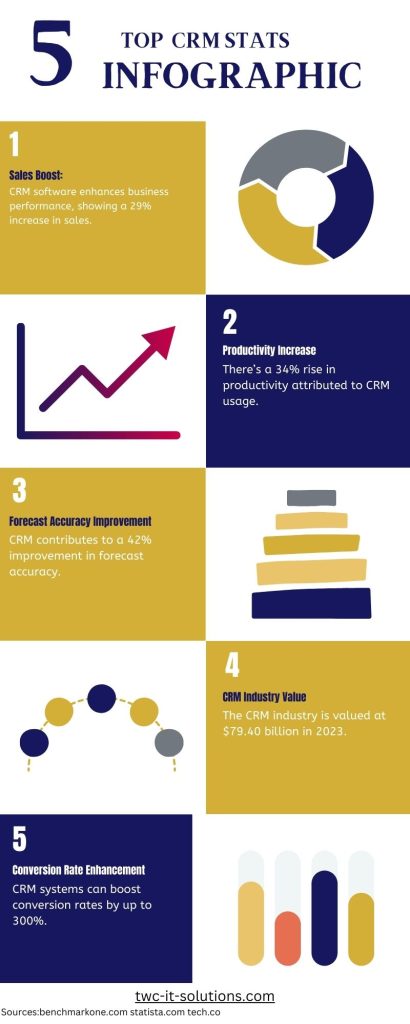Key CRM Statistics Every Scaling London SME Should Know in 2024
In the contemporary business landscape, the utilisation and understanding of Customer Relationship Management (CRM) statistics are imperative for organisations seeking to enhance customer engagement and catalyse sales growth. In this article, we delve into the most pertinent CRM statistics, offering a comprehensive overview of the current and future trends within the CRM domain.
CRM software significantly enhances business performance, with statistics showing a 29% boost in sales, a 34% increase in productivity, and a 42% improvement in forecast accuracy. The CRM industry, valued at $79.40 billion in 2023, is witnessing a robust growth trajectory. (source)
Top 5 CRM stats Infographic

The Latest CRM Statistics for 2025
Here are some key statistics and insights:
▶ Year-on-Year Growth: The CRM market is witnessing a 12.6% year-on-year growth in adoption. This indicates a robust expansion and increasing reliance on CRM systems across various industries. (source)
▶ Conversion Rate Boost: CRM systems can significantly enhance business performance. For instance, it’s reported that CRM can boost conversion rates by up to 300%, according to Finances Online. (source)
▶ Market Revenue Projection: The revenue from CRM is expected to surpass $80 billion by 2025, reflecting the growing importance and investment in CRM technologies.(source)
▶ Customer Engagement: A notable percentage of customers (44%) tend to ignore sales pitches that are unprepared, highlighting the importance of CRM in preparing effective customer engagement strategies.(source)
▶ Buyer Impressions: Around 43% of buyers believe that the impression they receive from a business matters significantly, which underscores the role of CRM in shaping customer perceptions and experiences.(source)
▶ Market Share Leaders: In terms of market share, Redtail is leading the CRM software market in 2023, holding a dominant 49 percent share.(source)
Key CRM statistics for 2023
Here are some key statistics and insights:
▶ Increase in IT Budgets for CRM: A significant 44% of businesses are planning to increase their IT budgets to invest more in CRM solutions. This is an increase from 38% in previous years, indicating a heightened focus on CRM technologies.(source)
▶ Sales Professionals’ Perspective: According to a report, 77% of sales professionals state that their organisations plan to invest more in sales intelligence tools, including CRM systems. This underscores the critical role of CRM in sales and marketing strategies. (source)
▶ Early Adoption of CRM Technologies: Most companies are investing in CRM technology within the first five years of their launch, suggesting that CRM systems are considered essential tools from the early stages of business development. (source)
▶ Leading CRM Providers: The CRM market is dominated by major players like Salesforce, Adobe, Microsoft, Oracle, and SAP. These companies hold significant market shares and are key drivers of CRM technology advancements. (source)
▶ Industry-Wide Reliance: The growing reliance on CRM solutions is evident across various industries, not limited to tech-centric sectors. This trend reflects the universal need for effective customer relationship management in today’s business landscape. (source)
CRM software statistics for 2023
CRM market share in 2023
▶ Market Share: Salesforce holds a significant portion of the CRM market, with a 19.8% share. This substantial market share cements Salesforce’s status as the leading CRM vendor. (source)
Dominance Over Competitors: Salesforce’s market share is notable, especially when compared to its competitors. It surpasses the combined market share of its top four competitors, illustrating its dominance in the CRM market.
▶ Growth and Revenue: Salesforce has not only maintained its market share but also grown its revenue more than any other CRM vendor in the recent period, further solidifying its market position. (source)
CRM adoption rates for 2023
▶ CRM Adoption Growth Projection: Over the next five years, a growth of 12% in CRM adoption is projected. This suggests a steady and continued increase in the utilization of CRM systems. (source)
▶ Recent Years’ Trends: While specific year-on-year adoption rates for each preceding year are not detailed in the sources, the overall trend has been towards increased adoption. For instance, in 2020, there was a notable increase in the use of CRM software on mobile devices, driven by the growing adoption of cloud-based CRM solutions. (source)
▶ Market Dynamics: The increasing adoption rates can be attributed to several factors. These include the digital transformation of businesses, the need for improved customer relationship management in a competitive market, and the evolution of CRM systems to offer more comprehensive, user-friendly, and integrated solutions.
Global CRM industry growth forecast for 2023
The Main Challenges Faced in CRM Adoption and Usage
1. CRM user experience and adoption barriers
2. Utilisation statistics for mobile CRM applications
3. Conversion rates for companies using CRM
“Best practises” for overcoming CRM adoption challenges
How Companies Leverage CRM Statistics to Improve Sales and Revenue Generation
1. Effective CRM usage for optimising conversion rates
2. Examples of successful CRM implementation strategies
3. Comparative statistics on CRM and non-CRM sales performance
4. Utilising CRM statistics to improve customer retention rates
Key Benefits of CRM Software and its Role in Customer Data Management
1. Benefits of CRM in improving customer relationships
2. Enhancing customer service through CRM solutions
According to a report on SuperOffice, 74% of users say that CRM software has improved their access to customer data. This is significant as better access to data enables more personalised and efficient customer service. (source)
3. Impact of CRM on customer satisfaction and retention
CRM systems have been shown to increase customer retention rates by 27%. This significant increase underscores the effectiveness of CRM tools in maintaining customer relationships and encouraging repeat business. (source)
4. Demystifying misconceptions about CRM software
High Adoption Rate Among Smaller Companies: 91% of companies with 10 or more employees use CRM. This statistic highlights the widespread adoption of CRM solutions among smaller businesses, countering the notion that CRM is only suitable for larger companies.(source)
CRM Adoption in SMBs: 65% of small and medium-sized businesses adopt a CRM within their first five years. This indicates a strong trend towards CRM adoption among SMBs, recognising its value in managing customer relationships effectively from early stages of business growth.(source)
CRM in the Service Industry: 32% of businesses that use CRM are from the service industry, many of which are likely to be small and medium-sized enterprises. This shows the relevance of CRM systems across various sectors, including those dominated by smaller businesses.(source)
▶ System & CRM Integration Services
FAQ for CRM Stats
What is CRM in Statistics?
What is the difference between CRM and Data?
Is CRM considered big data?
What are the 3 types of CRM?
Operational CRM: Focuses on streamlining business processes involving customer interactions, primarily in sales, marketing, and service.
Analytical CRM: Involves analysing customer data to improve decision-making, understand customer preferences and behaviours, and enhance customer relationships.
Collaborative CRM: Aims to improve communication and collaboration between a business and its customers, as well as within the business, to enhance customer service and experience.
How do you measure CRM performance?
Customer Satisfaction: Through surveys and feedback to gauge how happy customers are with your service.
Sales Metrics: Like conversion rates, average deal size, and sales cycle length to understand sales effectiveness.
Customer Retention and Churn Rates: To evaluate how well the CRM is maintaining customer relationships.
Revenue Growth: Attributable to CRM activities, indicating the system’s impact on the business’s bottom line.
Engagement Metrics: Such as email open rates, social media interactions, and website visits to assess customer engagement levels.
Get a Quote within 48 hours
Contact TWC IT Solutions and our dedicated team will address your inquiries and requests, ensuring that you receive the assistance you seek within 48 hours.





















